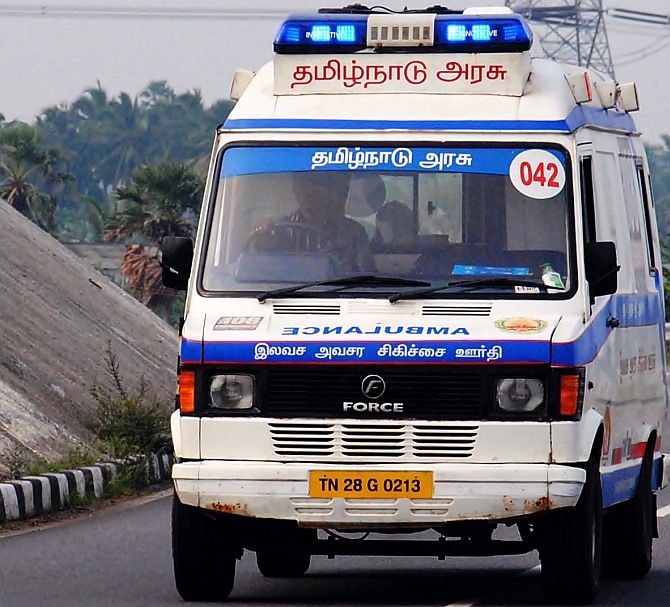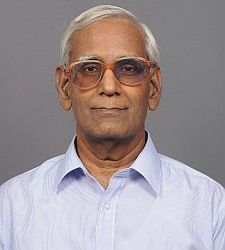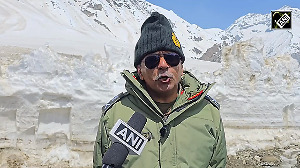"Tamil Nadu has the most efficient and effective cadaver transplant programme in India," says Virginia Vaidhyanathan of the India-US Transplant Foundation.
Aziz Haniffa/Rediff.com discovers how the US-based charitable organisation, founded by Mrs Vaidhyanathan after Indian doctors saved her husband's life, is closely linked to the story of organ transplants in India
The India-US Transplant Foundation, founded by New York-based Virginia 'Ginny' Vaidhyanathan after Indian doctors saved her husband's life during a family visit to India, will make its presence felt at a major global conference of the National Association of Transplant Coordinators in San Antonio, Texas.
C E Karunakaran, the first recipient of the Les Olson Honorary Scholarship presented by the I-USTF, and Vedana Vaidhyanathan, daughter of Ginny Vaidhyanathan and vice-president of the I-USTF, will deliver a presentation on 'The History and Development of India's Cadaver Organ Transplant Programmes’ at the conference to be held on August 10-13, 2014.
I-USTF is a charitable foundation dedicated to enhancing education, ethical changes and organisations in India’s organ sharing environment.
Karunakaran is a trustee of the National Network for Organ Sharing in Chennai, where he has been instrumental in the development of Tamil Nadu's cadaver organ transplant programme.
He is an advisory board member of the I-USTF, and has also been an adviser to other transplant programmes in India.
The Les Olson Honorary Scholarship is named after the man known for his history-making research and development of organ procurement procedures.
He was one of the I-USTF's first advisory board members.
Of his own volition, Olson had joined with the I-USTF to attend the first meeting of transplant professionals organised in Chennai in 2007.
America's organ transplant developed "willy-nilly," Ginny Vaidhyanathan reminded Rediff.com, "until a lot of Washington lobbying ensured that hospitals receiving Medicare and government-backed Medicaid funding had to participate in the United Network for Organ Sharing."
"India's transplant programmes," she felt, "look terribly fragmented, and there is no over-arching HHS (the United State Department of Health and Human Services) or Medicare in India to coordinate the efforts. India's Transplantation of Human Organs Act of 1994 only provides a framework for each state to work out its own transplant programme without help from the central government."
This means, Vaidhyanathan continued, "that some states do not even have official programmes. Those which do are not equivalent with the advances of a state like Tamil Nadu."
"Tamil Nadu has the most efficient and effective cadaver transplant programme in India, thanks to the work of organisations like NNOS, the Mohan Foundation and individuals in and out of government, like Karunakaran and other Indian honorary members of I-USTF."
"The I-USTF mission has always been to assist in the education of India's transplant professionals. I conceived I-USTF after befriending two transplant surgeons who worked in the University of Miami's transplant programme in 2004."
"Both surgeons went back to Tamil Nadu, determined to take their skills and talents as surgeons to the people who needed heart and multi-visceral transplants. Both had to leave India to practice their profession. There was virtually no infrastructure to support the procurement, transport, or preservation of organs recovered from deceased donors. There was virtually no training or support for post-operative care."
"One surgeon, Dr Mohan Thanikachalam, developed NNOS and still works in India periodically," Vaidhyanathan said.
"Developing Tamil Nadu's transplant infrastructure has been a Herculean task. It has taken years of political development as well as medical, surgical and infrastructure training."
Dr V S Vaidhyanathan, I-USTF president, told Rediff.com, "Realising that at least six India-trained physicians directly affected my successful heart transplant, I am grateful to the training that they received in India. So, it makes me happy to give back, even a little, to Indian medical care through the work of I-USTF."
Karunakaran, a mechanical engineer by training, told Rediff.com, "I got involved in promoting deceased donor organ donation in 2005, nudged to do so by Dr Mohan Thanikachalam who wanted to start a heart transplant programme in a hospital in Tamil Nadu. Some four of us -- all non-medical professionals -- got together to form the National Network for Organ Sharing for this purpose.”
 “At the very beginning itself we realised that this will not get anywhere unless the state government gets involved, and held meetings with them, culminating in a conference of all registered transplant hospitals jointly organised by NNOS and the state health department."
“At the very beginning itself we realised that this will not get anywhere unless the state government gets involved, and held meetings with them, culminating in a conference of all registered transplant hospitals jointly organised by NNOS and the state health department."
"This led to the department taking an active role in passing a series of government orders to establish an organ sharing framework called the cadaver transplant programme," Karunakaran said. "We are actively assisting this programme in all possible ways and have also initiated a donor action programme to get more and more hospitals involved in identifying brain death and counselling families for organ donation. I am on the state advisory committee that oversees the programme."
"Tamil Nadu," he pointed out, "was the third state in India to start such a programme, but now leads in terms of the total number of deceased donors. It had 130 donors in 2013, amounting to 1.8 per million population, as compared to 0.26 estimated for the country as a whole."
"This has become possible because of the active involvement of transplant centres in framing the organ share guidelines, the transparent functioning of the programme, and dedicated effort of two key government officers, Dr J Amalorpavanathan, convener of the programme, and P W C Davidar, senior IAS (Indian Administrative Service officer."
"The British Medical Journal commissioned an article to specifically explain the Tamil Nadu programme and published it April 12, 2013, under the headline 'Has Tamil Nadu turned the tide on the transplant trade?'" Karunakaran said.
"Realising that most people with kidney failure in India cannot afford the cost of the organ transplant option, I am also fully involved in another project started by NNOS among the rural population to prevent, or slow down as much as possible, failure of the kidney, as well as heart attacks and strokes."
Images: Top: An emergency ambulance in Tamil Nadu. Photograph: Jaaron95/Wikimedia Commons; Below: C E Karunakaran, one of the four founding members of the National Network for Organ Sharing in Tamil Nadu.









 © 2025
© 2025